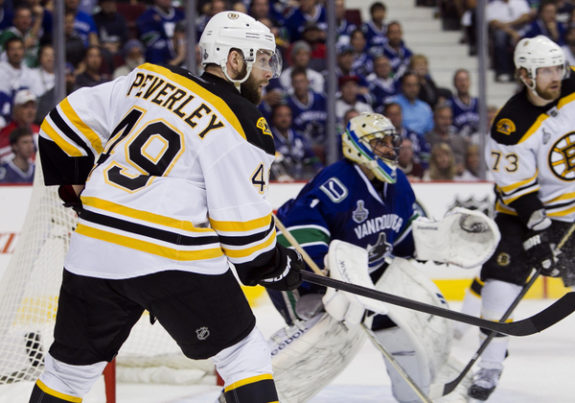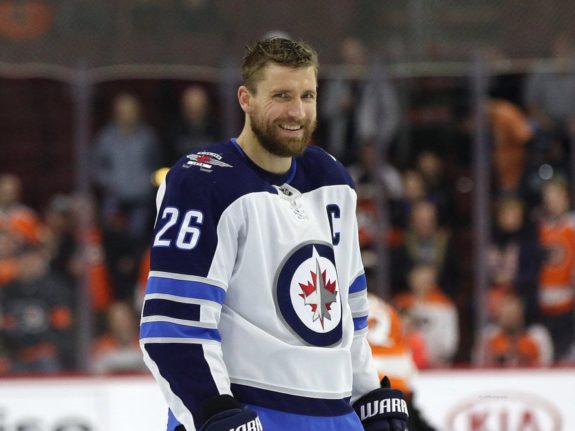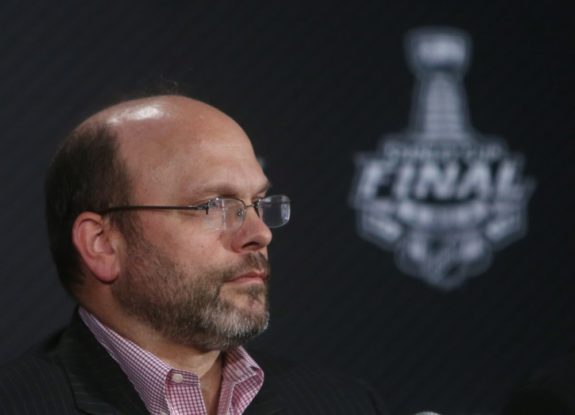It has been more than six years since the Boston Bruins agreed to send Blake Wheeler and Mark Stuart to the Atlanta Thrashers in exchange for Rich Peverley and Boris Valabik. At the time many felt the trade was a win for Peter Chiarelli and company, as the veteran winger played a key role in helping the club win the 2011 Stanley Cup and some still believe that to be true to this day.

The beauty with so much time having elapsed since the swap was made, is the history we can now look back on to help determine who came out on the better end of the deal..and it has been some time. It may not seem like it has been that long but the Thrashers haven’t been a thing in the NHL since the end of the 2011-12 season when the franchise left town and became the second incarnation of the Winnipeg Jets.
Bruins Paid a Steep Price
Of the four players who were involved in the trade, Wheeler is the only one currently playing in the NHL and still has plenty of gas left in the tank. [At the time of writing], the Plymouth native is a perennial 25-goal/70-point man and has scored 150 times and picked up 262 points in 485 games since leaving Beantown.
In short, he has been extremely productive and turned into one of the best players to have suited up for the Jets 2.0. No matter what angle you look at it, Wheeler’s numbers speak for themselves. He has scored at least 26 goals in four of the seasons since leaving Boston and scored 60-plus points in everyone but the lockout-shortened 2013 campaign, in which he picked up 41 points in 48 games. Not too shabby at all.

Obviously, there is a risk that comes with moving a player who was taken fifth overall in the 2004 Entry Draft and it has certainly come back to bite the Bruins. Though not drafted by the organization, as Wheeler signed as free agent in July 2008 after failing to come to terms on an agreement with the Phoenix Coyotes on an entry-level deal, he was supposed to be a key piece to their future puzzle.
Wheeler Worth the Hype
As far as Peverley goes, we are talking about a player who was essentially a 35-40-point player that could play anywhere in the top nine but was best suited inside the bottom six and was four years older. A useful player to be sure but from a value standpoint, it was a deal that made no sense for Boston to make. However, when you realize the organization had their sights set on taking a run at the Stanley Cup, it’s suddenly not so cut and dry.
Having already picked up Chris Kelly from the Ottawa Senators earlier in that same week and agreeing in principle but not announcing a deal to acquire Tomas Kaberle from the Toronto Maple Leafs, the general manager suddenly had his hands tied. The Bruins needed to make a subsequent move in order to have Kaberle trade fit under the cap and Wheeler ended up becoming the chip Chiarelli would play.

Though Wheeler did not disappoint during his two-plus seasons in Boston, the chance at taking a run at winning the Cup for the first time since 1972 was too great to pass up on. With all three of the aforementioned players added to what was already in place, the Bruins would go on to get the job done and lift Lord Stanley’s mug for the first time in 39 years. Can you say mission accomplished?
Peverley Was Good But…
With that in mind, one has no choice but to take a step back and re-examine the deal from a different angle. Like it or not, the fact Boston went on to win the Cup does play a part in this, as the move was made with the intention of doing exactly that. A fair point to be sure but would the Bruins have still won had they decided to move another player to create room for Kaberle? In my mind, the answer to that question would be yes.
As good as Rich Peverley was during those playoffs, he wasn’t the main reason Boston ended their lengthy drought and that simply cannot be overlooked. He most certainly helped but does a post-season run and two middling bottom six seasons outweigh what Blake Wheeler has accomplished over the past six years? Obviously not and for that reason, the trade remains a massive win for the Thrashers/Jets and one that keeps paying dividends.
* originally written in Oct. 2017